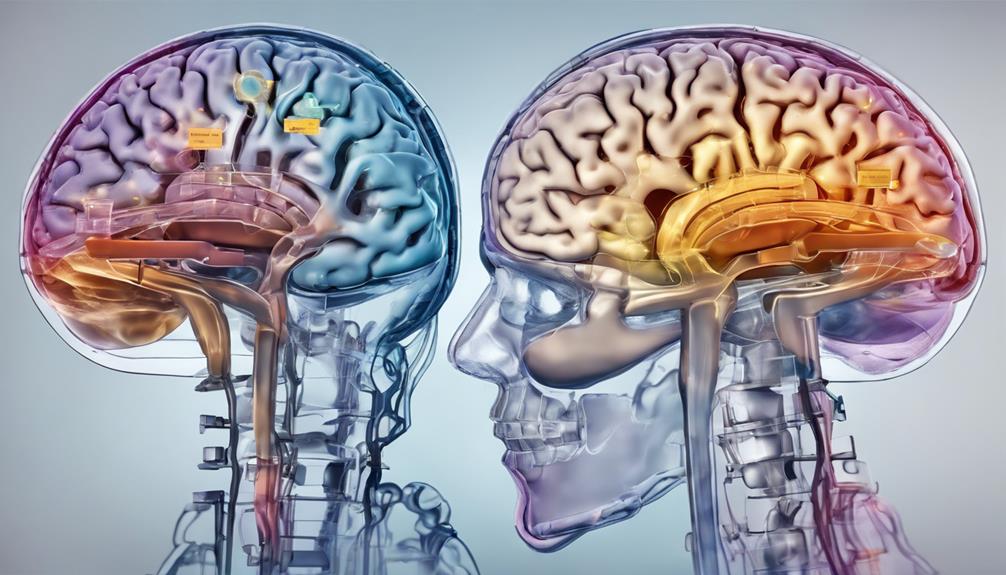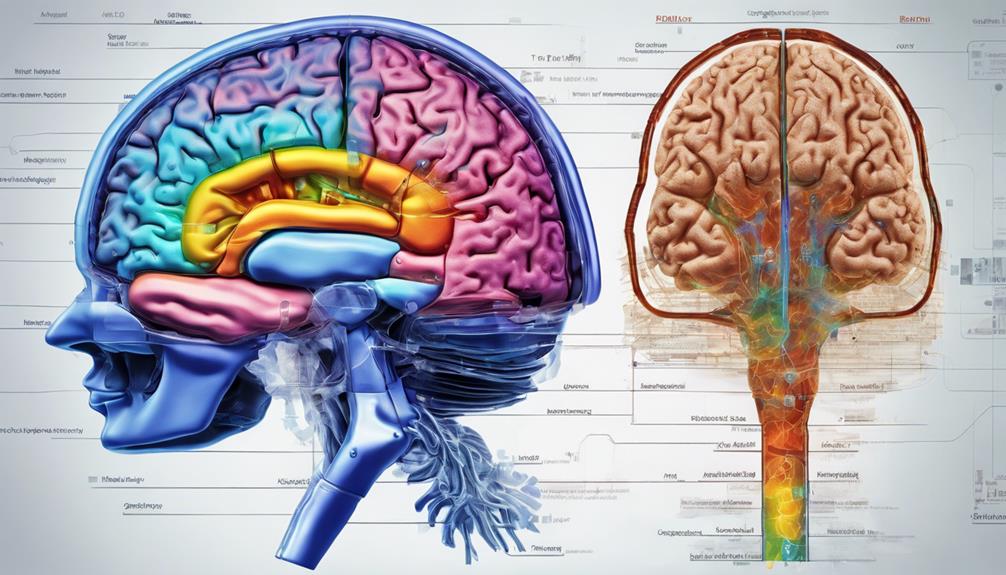In the Journal of Alzheimer’s Disease, seven pioneering studies have been identified. They unveil new biomarkers for early detection of Alzheimer’s and to enhance quality of life. State-of-the-art treatments are centered on managing cognitive decline through personalized care plans. Utilizing targeted drug delivery using nanoparticles improves treatment efficacy while minimizing side effects. Precision medicine approaches customize interventions to enhance cognitive function. Our knowledge has expanded on the underlying disease mechanisms and how lifestyle and genetics impact Alzheimer’s susceptibility. Advanced imaging technologies and upcoming therapeutic strategies offer optimism for improved results. Delve into these studies to uncover valuable perspectives on managing and treating Alzheimer’s.
Key Takeaways
- Novel blood biomarker identified for Alzheimer's neurodegeneration.
- Achieved 100% accuracy in Alzheimer's and Mild Cognitive Impairment detection.
- Research published in Journal of Alzheimer's Disease and Frontiers in Neuroscience.
- Early detection through biomarkers enhances patient outcomes.
- Holds promise for advancing Alzheimer's research and improving treatment.
Identification of Novel Alzheimers Biomarkers
In our recent groundbreaking studies, we've identified a novel blood biomarker for neurodegeneration in Alzheimer's disease. This research, published in the Journal of Alzheimers Disease, has introduced a significant advancement in the field of Alzheimer's research.
The new technology showcased an impressive 100% accuracy in identifying individuals with Alzheimer's disease and Mild Cognitive Impairment (MCI) who later developed Alzheimer's. This breakthrough, detailed in the study published in Frontiers in Neuroscience, provides precise insights that can greatly benefit patient care.
Early detection of neurodegeneration through these biomarkers is vital as it can lead to improved quality of life, tailored treatment plans, and potential therapeutic interventions for those affected by Alzheimer's disease.
With an estimated 6.7 million Americans over 65 affected by Alzheimer's, the identification of these novel biomarkers holds immense promise in enhancing patient outcomes and advancing the fight against this debilitating disease.
Exploration of Advanced Treatment Approaches

We'll now explore advanced treatment approaches for Alzheimer's disease.
Our focus will be on three key points:
novel therapeutic options,
targeted drug delivery, and
precision medicine strategies.
These innovative methods hold promise for improving patient outcomes and addressing the complexities of this condition.
Novel Therapeutic Options
Delving into the domain of innovative therapeutic options, the Journal of Alzheimer's Disease presents cutting-edge approaches for managing cognitive decline. Studies in the journal focus on early Alzheimer's interventions to enhance quality of life for individuals affected.
These advanced treatment approaches offer personalized care plans tailored to each patient's unique needs. By exploring novel therapeutic options, researchers aim to address the complexities of neurodegenerative diseases and improve cognitive function.
The insights provided by these studies underscore the importance of holistic care and individualized interventions in combating cognitive decline. Through the exploration of these innovative strategies, the Journal of Alzheimer's Disease aims to pave the way for a better understanding of how to effectively manage and treat Alzheimer's and related dementias.
Targeted Drug Delivery
Exploring advanced treatment approaches, targeted drug delivery in Alzheimer's disease involves precisely directing medications to affected brain regions for improved therapeutic outcomes while minimizing side effects.
In Alzheimer's research, scientists utilize nanoparticles and liposomes to deliver drugs precisely where they're needed in the brain. By targeting drug delivery, the goal is to enhance the effectiveness of treatments while reducing the exposure of the rest of the body to these medications.
This innovative approach holds great promise in the field of neurodegenerative diseases like Alzheimer's. The use of targeted drug delivery is a significant step forward in improving how we manage and treat Alzheimer's disease, offering hope for better outcomes in the future.
Precision Medicine Strategies
In the Journal of Alzheimer's Disease, the focus shifts to precision medicine strategies that target advanced treatment approaches for cognitive decline. These personalized interventions aim to address specific factors contributing to disease progression in individuals with Alzheimer's, emphasizing the importance of tailored care plans for effective cognitive performance.
Studies have shown significant improvements in cognitive function after six months of intervention utilizing precision medicine strategies. Essential detection plays a vital role in implementing these targeted approaches, allowing for timely and proactive measures to be taken.
Ongoing support, including nutrition and cognitive assessments, are integral components of the multimodal intervention designed to enhance the quality of life for Alzheimer's patients. By leveraging precision medicine strategies, healthcare providers can better serve individuals experiencing cognitive decline.
Mechanisms Underlying Alzheimers Disease Revealed

Our understanding of Alzheimer's disease progression has been greatly enhanced through recent research uncovering the vital role of microglia in clearing iron-rich myelin debris. These findings highlight the significance of microglial function in maintaining cognitive health and preventing dementia.
Dr. Stephen Back's work at OHSU revealed microglial degeneration in the brains of individuals with dementia, shedding light on the mechanisms underlying cognitive decline. Additionally, Dr. Adeniyi's innovative technique confirmed the role of iron toxicity from myelin fragments in leading to microglial degeneration, providing further insights into the disease process.
Understanding the interplay between neurodegeneration, myelin deterioration, and microglial dysfunction is essential in unraveling the complexities of Alzheimer's disease. Targeting microglial degeneration could offer a promising avenue for developing therapeutic interventions aimed at addressing cognitive decline in dementia. By addressing these underlying mechanisms, researchers and healthcare professionals can work towards more effective strategies for managing and potentially slowing down the progression of Alzheimer's disease.
Impact of Lifestyle Factors on Alzheimers Risk

When considering the impact of lifestyle factors on Alzheimer's risk, it's crucial to understand how our diet can influence the development of the disease.
Research indicates that consuming a Western diet high in fat and cholesterol may increase brain inflammation associated with Alzheimer's.
Additionally, engaging in regular exercise has been shown to benefit brain health and potentially reduce the risk of cognitive decline.
Diet and Alzheimers Risk
Investigating the impact of dietary choices on Alzheimer's risk reveals significant correlations between specific food consumption and the development of the disease. When considering how our diet influences Alzheimer's risk factors, it's essential to understand the following:
- A diet high in fat and cholesterol, such as the Western diet, can lead to diet-induced inflammation in the brain, increasing susceptibility to Alzheimer's.
- Proteins activated by diet-induced inflammation play an important role in triggering the development of Alzheimer's disease.
- Conditions like diabetes and metabolic syndrome, often influenced by diet, are linked to a higher risk of cognitive dysfunction and the onset of Alzheimer's.
Exercise Benefits Brain
Engaging in regular physical activity greatly reduces the risk of developing Alzheimer's disease. Exercise offers groundbreaking benefits for the brain by promoting cognitive function and reducing neurodegeneration. Studies have shown that aerobic exercise can enhance memory and overall brain performance.
When we exercise, blood flow to the brain increases, delivering essential nutrients and oxygen for peak cognitive function. By incorporating regular physical activity into our daily routines, we take a significant step towards mitigating Alzheimer's risk factors.
Prioritizing exercise as a lifestyle choice to support brain health and reduce the likelihood of developing this debilitating disease is crucial. Remember, a simple daily workout routine can have a profound impact on our long-term cognitive well-being.
Sleep and Cognition
Addressing sleep issues directly influences the risk of developing Alzheimer's disease by impacting cognitive function and brain health. When it comes to patients at risk, addressing sleep disturbances is vital in lowering the chances of developing Alzheimer's disease. To help patients maintain cognitive function and reduce Alzheimer's risk, ensuring they get adequate sleep is essential.
Here are three ways sleep can impact the risk of Alzheimer's:
- Poor sleep quality is associated with an increased risk of Alzheimer's disease.
- Disrupted sleep patterns have been linked to cognitive decline in patients.
- Sleep disturbances can hinder memory consolidation and brain health, contributing to the risk of developing Alzheimer's disease.
Role of Genetics in Alzheimers Development

Genetics intricately shapes an individual's vulnerability to developing Alzheimer's disease, with specific genes like APOE4 and variants in TREM2 playing pivotal roles in this complex interplay.
Researchers funded by the National Institutes of Health explore the genetic landscape of Alzheimer's Disease Research to uncover how certain genes can increase the risk of developing this condition. Understanding these genetic factors is vital as they can help predict and diagnose Alzheimer's disease.
Variants in the TREM2 gene, for instance, have been linked to an elevated risk of developing this neurodegenerative disorder. Genetic testing, which analyzes an individual's genetic makeup, can offer valuable insights into one's predisposition to Alzheimer's.
Novel Imaging Techniques in Alzheimers Research

Utilizing cutting-edge imaging technologies, we explore the intricate details of Alzheimer's disease progression. These novel imaging techniques offer a closer look at the changes happening in the brain of patients with Alzheimer's, aiding in our understanding of the disease.
- Advanced imaging methods, such as PET scans and MRI, provide detailed views of the structural and functional alterations in the brains of patients with Alzheimer's.
- These imaging tools reveal biomarkers associated with Alzheimer's pathology, helping in the early detection and monitoring of disease-related changes.
- By incorporating high-resolution imaging techniques, researchers can track the progression of Alzheimer's disease in clinical trials and contribute to advancing research in the field.
Future Therapeutic Interventions for Alzheimers

Exploring potential therapies targeting microglial degeneration presents a pivotal avenue for advancing Alzheimer's treatment. In the field of dementia research, scientists at the School of Medicine are investigating how pharmaceutical compounds could address this key mechanism in cognitive decline. Studies suggest that microglial degeneration, often triggered by reduced blood flow and oxygen supply to the brain, plays a vital role in the progression of Alzheimer's. By understanding the intricate relationship between neurodegeneration, myelin deterioration, and microglial function, researchers aim to develop innovative interventions that could improve outcomes for patients.
Targeting microglial degeneration through new therapeutic approaches holds great potential for enhancing Alzheimer's care. These future interventions may offer hope for individuals and families affected by this challenging disease. Continued research into these novel treatments is essential for advancing our understanding of Alzheimer's and improving the quality of life for those living with the condition.
Frequently Asked Questions
What Is the Major Breakthrough in Alzheimer's Research?
We discovered a major breakthrough in Alzheimer's research, focusing on enhanced cognition in those with cognitive decline. Participants experienced notable cognitive improvements after a personalized intervention, emphasizing the need for tailored approaches in addressing cognitive decline. This intervention showed promising results, particularly in slowing the early onset Alzheimer’s progression speed, suggesting that timely and individualized treatments can have a meaningful impact. Additionally, the study underscored the importance of early detection and intervention to potentially delay the negative trajectory associated with cognitive decline. As research continues, these findings may pave the way for more personalized therapies aimed at optimizing brain health.
What Is the Best Journal for Alzheimer's Disease?
We find the best journal for Alzheimer's disease research to be the Journal of Alzheimer's Disease. Its multidisciplinary approach, publication of research reports and reviews, and a high Impact Factor of 4 make it a valuable resource for the scientific community.
Is There Any New Research on Alzheimer's Disease?
Yes, we discovered new research on Alzheimer's disease emphasizing personalized, multimodal interventions for cognitive decline. Ongoing nutrition support led to significant cognitive improvements after six months. Dr. Heather Sandison's study showcased the importance of holistic approaches.
What Is the Ranking of the Journal of Alzheimer's Disease?
We're proud to share the Journal of Alzheimer's Disease holds a significant Journal Impact Factor of 4, underlining its importance in Alzheimer's research. Our team values its contributions to understanding and treating this disease.
Conclusion
To sum up, the groundbreaking studies in the Journal of Alzheimers Disease have provided valuable insights into the identification of novel biomarkers, advanced treatment approaches, underlying mechanisms, lifestyle factors, genetics, imaging techniques, and future therapeutic interventions.
These studies offer hope for better understanding and management of Alzheimer's disease.
By staying informed and supporting ongoing research efforts, we can work towards finding effective solutions for those affected by this devastating condition.









